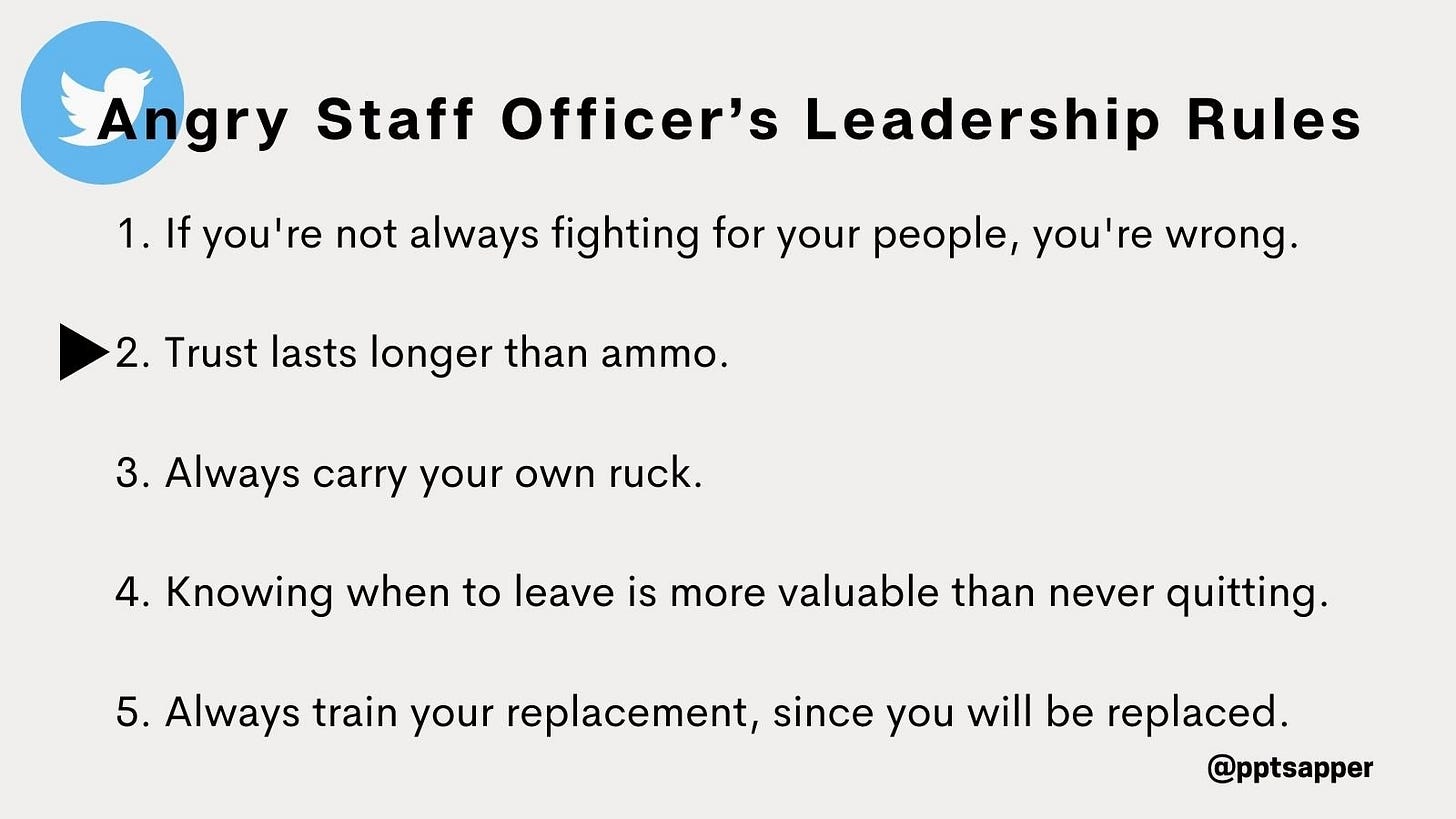Are you or have you ever been a boss or been someone who has a boss? Chances are, the answer is yes. If so, then this series of essays is for you.
Way back in March 2021, a Twitter user who goes by “Angry Staff Officer” (@pptsapper) posted a pithy and insightful list of “Rules for Army Leaders.” As I am sure you have already surmised, these rules, though specifically addressed to Army leaders, readily apply to any military leader, such as Navy leaders or Space Force leaders (though Space Force rucksacks may be weightless), but did you guess that they also apply just as well to any leader in any walk of life, including civilian bosses?
Over five consecutive weeks we will continue to take a look at each of these rules in turn and apply them to your experience with daily bossing, be you a bosser or a bossee.
Rule 2
Trust Lasts Longer than Ammo
Perhaps you are thinking, “Gee, Jim, I lead an agency that that provides affordable housing to lower income families. I can’t think of why we would have a need for ammunition.”
Yes, perhaps that is true in a boring literal sense, but have you considered the exhilarating experience of figurative tropes?
For the armed forces, ammunition is a quantifiable, finite resource that is indispensable to the military’s ability to fulfill its core mission. A military without ammo will not be particularly effective as a defensive or expeditionary force. For our purposes, though, ammo can be any quantifiable, finite, and vital resource that you need to fulfill the mission of your organization. Call it an analogy if you will, which you should because it is.
So, metaphorically speaking, what is your ammo? Money? Time? Equipment? People? Puppy kibbles? Information?1 What item or items, physical or disembodied, are fundamental to the completion of your goals? Think about it.
Sure, you probably use computers and telephones and would struggle to do your work without them, but are they absolutely essential? Maybe you would have been able to meet your mission, albeit greatly scaled down, in a time before computers and telephones. Maybe others did. To identify your ammo, dig to pinpoint those resources that are truly key to your core mission, and keep in mind that your ammo may be hiding in plain sight. Hint: it’s not those Post-Its on your desk.
Have you determined your ammo? Good. Let’s get back to Angry Staff Officer’s main point regarding trust.
Being an abstraction, trust can but never has to run out, and it is at least as vital to any mission as ammo (again, metaphorically). Without trust, nothing worth doing is possible. Trust holds organizations together and builds community. To fulfill your mission you will need some combination of trust among employees, leadership, board members, clients, and the larger community at the very least.
Even the production and consumption of this essay requires trust. I trust you to read it fairly and respond accordingly (please) and share it with others (pretty please). You trust me to deliver something worth reading to the end if only to disagree with me or just to confirm that my head truly consists of one large knuckle. Whatever the case, the relationship between you and me — the relationship this essay fosters and mediates — is all about trust.
When the logic of this essay has played itself out, when I am out of ammo, I trust that you will continue to consider my ideas and perhaps comment and share my link. If I have delivered enough here, you will trust me to deliver much the same level of engagement in my next essay. And so on.
Therefore, as vital as ammo is, trust is more precious because it has more staying power. Also, while we must obtain new ammo from outside to keep ourselves supplied, trust is internally generated and, when tended properly, self-renewing.
I have been a part of organizations where trust was lacking, and I imagine you have too. Sure, given ample ammo, such institutions may still limp along, usually on the plentiful resources and, yes, limited trust they have, but they can never fully live up to their potential nor their mission. Their shortcomings are usually abundant and apparent to all. Whatever its resource level, a trustless organization is a dysfunctional organization.
In your organization, think of whom you must trust in order to do your job and make your mission work. Think of who trusts you. How do you nurture those relationships? Are they scalable? In other words, if the scope of your mission grew, would the trust relationships you share now be enough to stay on mission, or would you need to develop new relationships?
Maintaining your ammo supply is absolutely critical, to be sure, but good leaders will be even more focused on fostering trust with and among their people. Otherwise, even with plenty of ammo, you will have no cohesive sense of purpose. Ammo is necessary, but only trust will keep you on mission.
Next Thursday: Rule 3, “Always carry your own ruck.”
Query of the Week
The Trusty Challenge
Think of an organization you are aware of that seems to lack trust. How do they get anything done? How would the organization function if it had plenty of trust? How would it achieve that goal?
Share your thoughts on this topic or open a discussion by leaving a comment below or by contacting me directly by email:
Let me know what you think. I welcome your comments and questions.
Please click on the button below or, if you prefer, email me at jim@jimsalvucci.com.
Post this essay on social media or send it by email to someone you want to intrigue/annoy.
Subscribe to receive my weekly newsletter and special editions directly to your mailbox.
You can improve your ability to achieve your mission of your organization.
Visit my website and reach out to me to learn how.
Is information quantifiable? If you are not sure, answer this question: How big is your hard drive? Is information finite? I don’t know, but our capacity to gather and utilize it sure is.

















Share this post